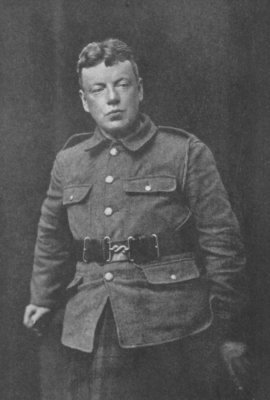Transcriber's Note:
Inconsistent hyphenation in the original document hasbeen preserved.
Obvious typographical errors have been corrected. Fora complete list, please see the end of this document.
A HISTORY OF
THE UNITED STATES
BY
WITH AN INTRODUCTION BY
G. K. CHESTERTON
LONDON
CHATTO & WINDUS
1919
First published January 16, 1919
Second impression January 17, 1919
All rights reserved
Russell & Sons photo
CECIL CHESTERTON
DEDICATED TO
MY COMRADE AND HOSPITAL MATE,
LANCE-CORPORAL WOOD,
OF THE KING'S OWN LIVERPOOLS,
CITIZEN OF MASSACHUSETTS,
WHO JOINED THE BRITISH ARMY IN
AUGUST, 1914.
Each of the heroes around us has fought for his house and his line,
But thou hast fought for a stranger in hate of a wrong not thine.
Happy are all free peoples too strong to be dispossessed,
But happiest those among nations that dare to be strong for the rest."
—Elizabeth Barrett Browning.
[vii]INTRODUCTION
The author of this book, my brother, died in a French military hospitalof the effects of exposure in the last fierce fighting that broke thePrussian power over Christendom; fighting for which he had volunteeredafter being invalided home. Any notes I can jot down about him mustnecessarily seem jerky and incongruous; for in such a relation memory isa medley of generalisation and detail, not to be uttered in words. Onething at least may fitly be said here. Before he died he did at leasttwo things that he desired. One may seem much greater than the other;but he would not have shrunk from naming them together. He saw the endof an empire that was the nightmare of the nations; but I believe itpleased him almost as much that he had been able, often in the intervalsof bitter warfare and by the aid of a brilliant memory, to put togetherthese pages on the history, so necessary and so strangely neglected, ofthe great democracy which he never patronised, which he not only lovedbut honoured.
Cecil Edward Chesterton was born on November 12, 1879; and there is aspecial if a secondary sense in which we may use the phrase that he wasborn a fighter. It may seem in some sad fashion a flippancy to say thathe argued from his very cradle. It is certainly, in the same sadfashion, a comfort, to remember one truth about our relations: that weperpetually argued and that we never quarrelled. In a sense it was thepsychological truth, I fancy, that we never quarrelled because we alwaysargued. His lucidity and love of truth kept things so much on the levelof logic, that the rest of our relations remained, thank God, in solidsympathy; lo
